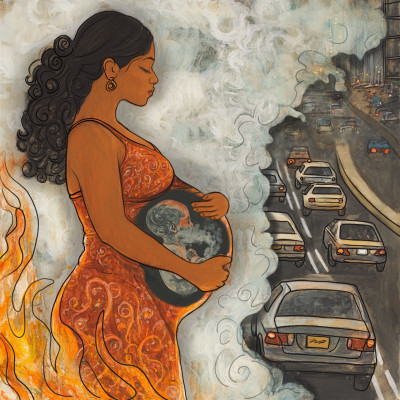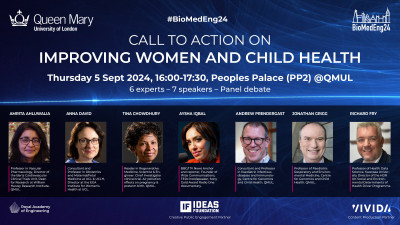News
Queen Mary researchers announce clinical trial into air pollution and pregnancy
26 September 2024


The unseen dangers in the air
Babies in the womb are threatened by harmful and hidden particulates from vehicle fumes and industry according to unpublished research from Queen Mary University of London presented at the BioMedEng24 conference on Thursday 5 September 2024. Images shown at the conference show specks of black pollutants visible within blood specimens and the womb. A panel of experts including Jonathan Grigg and Amrita Ahluwalia are urging immediate action to help raise awareness of issues that are affecting the health of women and children from conception through to old age.
The inter-disciplinary team of clinicians, climate scientists, bioengineers and epidemiologists at QMUL and UCL have announced a clinical trial with the aim of predicting the effects of air pollution exposure on pregnancy outcomes and risk of preterm birth. Tina Chowdhury, Reader in Regenerative Medicine at the Centre for Bioengineering and is Chief Investigator of the clinical trial said: "Preterm birth is the leading cause of neonatal death world-wide. Children born prematurely have higher rates of diseases and life-long disabilities. We are developing algorithms that link patient data on air pollution exposure to identify the women who are at greater risk of delivering preterm, according to their genetic, lifestyle and environmental situation. At the end of the clinical trial, we will know the timepoints at which pollution exposure has the greatest impact on the mother and baby.”
Anna David, Professor and Consultant in obstetrics and maternal/fetal medicine at UCLH and the Director for the EGA Institute for Women’s Health at UCL said “research shows that there are significant inequalities in health between men and women, who are rich or poor and who live in urban or rural communities and are from different ethnicity. We need to educate young people on how their likelihood of starting a family and having healthy children is affected by air pollution, smoking, obesity, alcohol, diet and other life-style factors.”
“We cannot ignore the undeniable link between pollution and the health challenges faced by women and children. It is imperative that we take decisive action to reduce environmental pollutants and protect the health of future generations,” said Jonathan Grigg, Professor of Paediatric and Environmental Medicine, Queen Mary's Centre for Genomics and Child Health.
Stark statistics
- Pregnant women exposed to high levels of pollution are at increased risk of preterm birth, low birth weight, and other adverse pregnancy outcomes.
- Children exposed to both indoor and outdoor pollution are at risk of asthma, respiratory disease, skin conditions, mental health issues.
- The chances of conceiving children after the age of 35 drop by 30%.
Andrew Prendergast, Professor of Paediatrics and Infectious Diseases at the Faculty of Medicine and Dentistry at QMUL said “The health of women translates into the health of the next generation. Our beginnings shape us: we need healthy mothers to ensure healthy babies.”
The critical need for fertility awareness
Many people lack adequate knowledge about their reproductive health, including understanding their fertility cycle, the impact of lifestyle factors on fertility, and the impact of pollution on their baby in the womb. Education is key to empowering women to make informed decisions about their reproductive health.
A Call to Action to Biomedical Engineers
QMUL urges governments, policymakers, research organisations and the private sector to increase investment in healthcare infrastructure and programs specifically targeted at improving the health outcomes of women and children. This includes funding for pollution reduction initiatives, fertility education programs, and research into how to prevent preterm births.
More about the study at https://safehr-data.org/data-cards/2024/air-pollution/index/
| Contact: | Tina Chowdhury |
| Email: | t.t.chowdhury@qmul.ac.uk |
| Website: | |
| People: | Tina CHOWDHURY Zion TSE Hazel SCREEN Martin KNIGHT Stefaan VERBRUGGEN |
| Research Centre: | Bioengineering |




